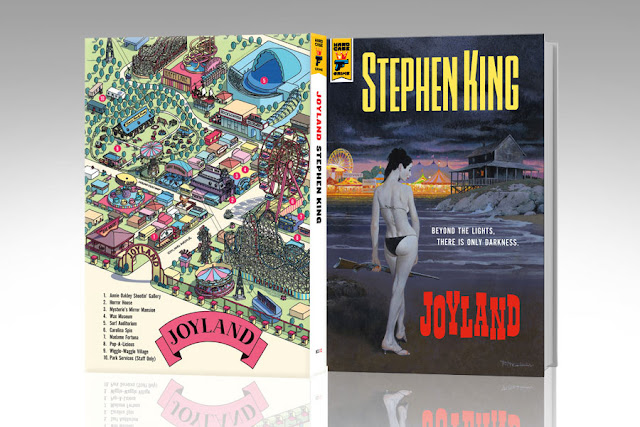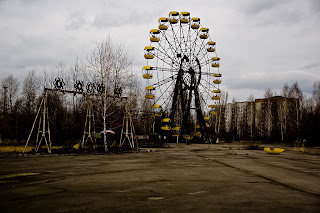To the strands of AC/DC's "Thunderstruck," we open on a car that resembles the one from the painting in "The Road Virus Heads North," speeding across a grassy field... We cut to a sign 'KING'S HIGHWAY, CLOSED FOR CONSTRUCTION,' then to the interior of the car. We hear KITT's (or is Daria's?) voice, warning the driver that he is exceeding an advisable speed limit. The driver inexplicably pounds the wheel with his fist and roars with rage and/or delight. Seconds later, the car smashes through the barricade, the soundtrack swells, and the car screams down the tarmac, racing towards an amusement park skyline in the distance...

Joyland came out last week, ending the King family triple-play that began with Owen's Double Feature and continued with Joe Hill's N0S4A2. If you haven't read it yet, I'll mark spoilers, below, so parachute-out when and if you have to.
 |
| Hardcover special edition, with this awesome map of the amusement park and variant cover. |
 |
| As re-blogged from Lilja's-Library. |
When I ceased blogging operations for the ol' King's Highway a few months back, I knew this was coming in June and greatly looked forward to it. Not just for the pleasure of reading it but as the first new material to dissect with my handy, hard-won King's Bingo Scorecard. I don't have an actual scorecard to show you, but it's easy enough to imagine. Picture a regular Bingo board/ ticket, only instead of numbers printed in each square, there are King-tropes, i.e. things that happen with self-evident frequency in his many published works of fiction.
For example, as applied to Joyland... (and I hesitate to say 'Spoiler Alert' here, as I'm not giving away plot points but simply checking the boxes of common-King-things, but, should you be extra sensitive to such things, then okay, 'Minor Spoilers Ahead.')
Is the protagonist from Maine? Yep.
Does someone entertain thoughts of suicide? Yep.
Is there a psychic child? Yep.
Are plot events foreshadowed explicitly by a dead character/ dream character/ psychic? Yep.
Is there a big-ass storm at the end? Yep.
Is there a racist antagonist? Not really.
Is there a misogynist antagonist? Sort of. Well, obviously, given the murder at the heart of the mystery, but not in King's usual Norman Daniels / Junior Rennie sort of exploration.
Is there a falsely-religious antagonist? Yep. (But not to the extent of Big Jim Rennie or Carrie White's Mom or others.)
Is there telepathy? Sort of, but not quite.
Is there a wisecracking sidekick with repetitive catchphrases? Not really. (Tom comes close here and there, but that's about it.)
Are there epistolary sections? Only very, very briefly. (Excerpts from Wendy's letters/ postcards.)
Is info deliberately withheld between chapters/ sections to build page-turning suspense? Absolutely.
Does someone not give "shit one" or say "happy crappy?" Yes to the first, not to my knowledge to the second.
Does someone imitate or engage in "mammy" dialogue/ reference Little Black Sambo? No, thankfully.
Perhaps the most important square: Is it a ridiculously enjoyable read? Yep, I'd say Joyland is pretty awesome.
One doesn't need a Bingo Card to access King's work, obviously, but hey. It's there if you want it/ need it. (And if you get more than five of these in the first 50 pages, or 5 pages for a short story, that's when you yell 'BINGO!' and cue the Price is Right music.)
This is a more traditional "hard crime case" than King's previous contribution to the series, The Colorado Kid, as discussed here: "Some see (Colorado Kid) as an enjoyable minor work that has some interesting
metafictive commentary on the nature of stories and mysteries; others
see it as an unenjoyably minor work that was marketed as a crime
thriller and/or mystery novel, but had no crime, no real mystery, and
absolutely no resolution. It felt a bit as if Hard Case Crime had
contacted King and said, "Hey, you wanna write a mystery novel for us?"
and King said, "Uh...yeah, sure, why not...here's this. It's not really
a mystery, and there's no crime in it," and Hard Case Crime said, "Can
we put your name on the cover?" and King said, "Absolutely," and Hard
Case Crime said, "In that case, the blatant lack of crime and/or mystery
is no problem for us at all.""
True. Fans of the genre will certainly recognize this as "one of their own," much moreso than The Colorado Kid, but I'd say fans of "love's first scar/ the summer that changed my life" sort of stories will find themselves in good company here, as well. Ditto for those who just like amusement park/ 1970s reverie. The only thing missing for me was a flume. (Ride the Flume! Awesome song.)
I'll get into some specifics of the story, now, so here's some pictures to separate the above from anything spoiler-riffic.



 |
| This last one is from an (obviously) abandoned amusement park near Chernobyl. The ones above it are not. (I think they're from an amusement park abandoned in the wake of Hurricane Katrina, but I forgot to jot down the exact name.) |
Still with me? Okedokey.
Let's start with the whodunnit aspect of the story. I'm not overly familiar with murder mysteries, but anyone with passing knowledge of television from the past five decades knows that the killer is nine times out of ten (with the tenth usually being a cheat and often unsatisfying) introduced early-on, that a red herring is often dangled before the reader, and then our heroes suss out the truth of it all. Joyland doesn't deviate from this well-worn path. After the reveal of the killer at novel's end - and I guess if you're still with me, here, I don't have to be coy about the identity - I went back through it to see if there was anything that forecast the reveal. King has said that he didn't know who the killer was going to be until he got to the end, himself.
Is this a good thing? Well, I'll answer that by saying it's not necessarily a bad thing. It makes sense for a killer-in-hiding to adopt a certain "cover personality," after all, and the true villain only appears with a snarl once unmasked.
Similarly, the ghost story doesn't intrude on the narrative too much. For most of it, I felt the ghost was just a literalization in-story of Devin's lost mother/ lost love. (One of my creative writing professors at RIC once raked me over the coals for utilizing this same trope for one of my stories, undoubtedly (waaay undoubtedly) an inferior work to this one, but it made me chuckle. Oh sure, when STEPHEN KING does it, it's fine...) Just the sort of metaphor one expects / works well with these things. But, this being a King story after all, I was happy with how this part of it played out. (Particularly the second ghost twist, i.e. Eddie Page's appearance/ warning to Mike.) Whether it's Turn of the Screw or Nightmare on Elm Street pt. 4, there's always a soul ill-at-rest that needs to be freed by proper resolution here in the material world. Day seized.
Mike and Annie are similarly drawn well, and I was particularly taken with Fred Dean's transformation once they were brought to the park. Nice touch.
The language of the novel is quite fun. Whether it's the carny "Talk," (Kevin Quigley made a good point in his review:"it's fun and immersive in a way that the relationship language in Lisey's Story had the tendency to be distracting") or the lyrical reflections on first love/ youth/ the capricious quality of life, this isn't quite up there with something like Duma Key or Hearts in Atlantis, but it's knocking on the door. Two quick examples:
(of the former) "You can't ride the jenny without a dogtop!"
(of the latter) "The end of my first love doesn't measure up to the death of one old friend and the bereavement of the other, but it followed the same pattern... a seismic shift in the previously unquestioned course of my life. You have to understand, I had no scale by which to judge it. That's called being young."
(Along those lines, I liked this, as well: "Bren thought I was dense; I thought she was old; we were both probably right." In addition to being funny - and kind of true - it's that rare example of a triple-semicolon-sentence that works.)
The ending is particularly poignant. It satisfies all genre requirements and adds some considerable heart, to boot.
Most of all, Devin is characterized very well, and he has moments of dialogue that don't seem all that surprising or unique out of context but more than a few times throughout I thought Now that's an interesting way to react. It was fun spending time from his point of view, and as always, King's physical descriptions and references snap crackle and pop off the page.
Tough for me to judge where this book lands in my personal rankings after only one read but best guess is between Storm of the Century and Insomnia. So, it cracks the top 20. Not bad for an old-timer.

One last thing:
At the beginning of his tenure at Joyland, Devin reflects:
"Do you know what I felt like just then? James Bond, in the movie where he's tied to some kind of crazy exercise gadget. Do you expect me to talk? he asks Goldfinger, and Goldfinger replies, with chilling good humor, No Mr. Bond, I expect you to die! I was tied to a happiness machine instead of an exercise machine, but hey, same idea."
I immediately made a note of this, as two Bond films are being mixed up here:
 |
| The exercise machine is from Thunderball, |
 |
| whereas the "Do you expect me to talk?" business is of course from Goldfinger. |
I thought I knew what King was doing. Oh, somewhere down the line, Devin will make this same reference, and someone will correct him. Fun way to characterize Devin/ make him that much more believable, as it's probably a mistake a casual Bond fan would make. But this didn't happen. Charles Ardai, co-founder of Hard Case Crime, edited this book, according to the Author's Afterword; where were ya on that one, Chuck? (I kid, I kid. And I'd expect this would be under the purview of some badly-paid intern, so really, it should be Where were ya, badly paid intern?)
I offer my service to Messrs King and Ardai for all future pop-cultural fact-checking; my rates are good and I'm told I'm a fun guy to have around the office.
Anyone see any Dark Tower / Kingverse easter eggs? (I did not.)







































